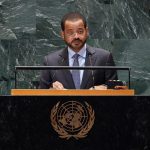In a recent development, ministers from Sweden and Finland have called for access to the EU budget to be tied to countries respecting the rule of law and fundamental rights without exception. This comes after Brussels blocked billions in funds to Poland and Hungary due to concerns over judicial reforms and democratic backsliding. The ministers emphasized the importance of all member states adhering to common values such as rule of law, democracy, and fundamental rights, which they have voluntarily signed up for. They have also suggested that billions in subsidies provided under the EU’s Common Agricultural Policy should be subject to similar oversight.
The suggested overhaul would require countries to meet common “enabling conditions” in order to access funds from EU programmes such as cohesion funding. These conditions include respecting the EU Charter of Fundamental Rights, failure of which can result in funds being frozen or suspended. Previously, after controversial judicial reforms in Poland, funds amounting to €76.5 billion were paralyzed until the impasse was resolved earlier this year. Similarly, in Hungary, almost €22 billion was frozen due to legal breaches. Therefore, ministers Rosencrantz and Strand are advocating for expanding this oversight system as a general feature in all areas of the EU budget.
The ministers are urging the European Commission to fully utilize a conditionality mechanism that can freeze cash in cases where the bloc’s financial integrity is at risk. They highlight the need for stronger rule of law conditionality to ensure that EU funds are used appropriately and responsibly, gaining the trust of taxpayers. This mechanism has only been used once so far, to address concerns over corruption in Hungary. Additionally, the Commission is reportedly considering taking action against Slovakia in response to legislative changes introduced by Prime Minister Robert Fico, including the abolition of the Special Prosecutor’s Office.
Commission President Ursula von der Leyen, in her political guidelines for her second term, has promised to establish a closer link between EU funds and respect for the rule of law. This is in line with the latest edition of the EU’s report on the rule of law, which indicated that Hungary and Slovakia had made limited progress on the previous year’s recommendations. Von der Leyen has also pledged a radical overhaul of the EU budget, with programmes tailored to individual country circumstances and contingent on reforms. This approach aims to ensure that countries receiving EU funds are upholding the rule of law and fundamental rights.
In conclusion, the proposal put forth by ministers from Sweden and Finland reflects a growing concern within the EU regarding the rule of law and democratic values in member states. By linking access to the EU budget with adherence to these principles, the ministers aim to uphold the core values of the European Union and foster trust among taxpayers. The European Commission’s commitment to strengthening rule of law conditionality and implementing measures to address concerns over corruption demonstrates a proactive approach to ensuring the responsible use of EU funds. This ongoing dialogue and action within the EU highlight the importance of upholding democratic norms and fundamental rights across member states.











